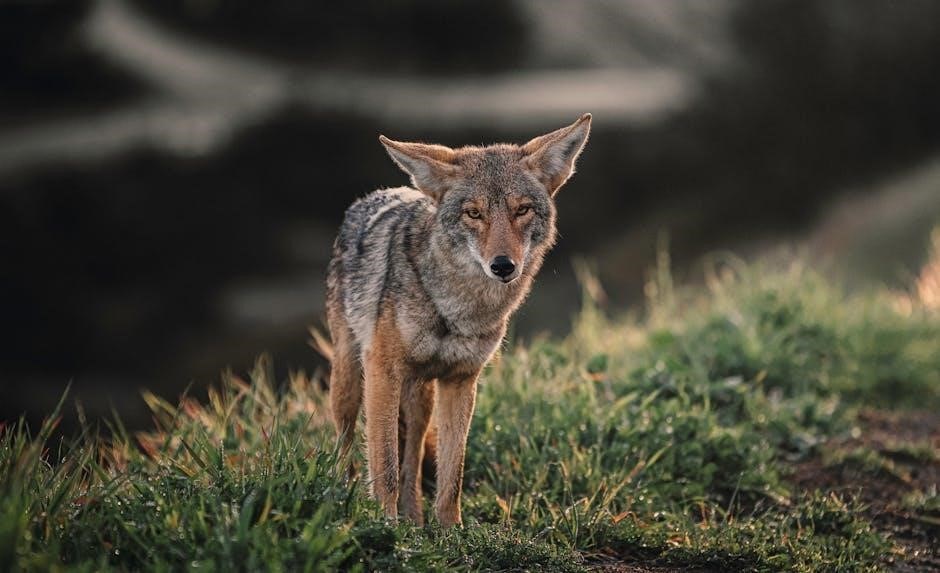
Bear hunting in North Carolina is a growing interest‚ with guided tours offering expert knowledge and equipment․ Hunters target black bears‚ primarily in fall and winter seasons․
1․1 Overview of Bear Hunting in North Carolina
Bear hunting in North Carolina is a popular outdoor activity‚ particularly for black bears‚ which are abundant in the state․ The primary hunting seasons occur in the fall and winter months‚ with hunters using firearms‚ muzzleloaders‚ or archery․ Guided tours are increasingly sought after‚ offering expertise and access to prime locations․ The state’s diverse terrain‚ from forests to coastal regions‚ provides ideal habitats for black bears․ Hunters often target areas in western North Carolina‚ where bear populations are higher․ With proper licensing and adherence to regulations‚ bear hunting remains a sustainable and thrilling experience for both locals and visitors․ It’s a tradition that balances recreation with wildlife conservation efforts․
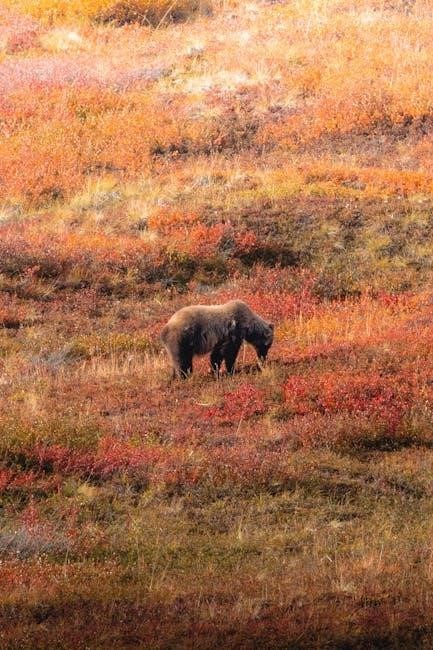
Bear Hunting Seasons and Regulations
Bear hunting in North Carolina occurs in fall and winter‚ using guns‚ muzzleloaders‚ or archery․ Seasons are planned annually‚ with limited spots available for guided hunts․
2․1 Seasonal Variations and Bag Limits
Bear hunting in North Carolina primarily occurs during the fall and winter months‚ with specific seasonal variations ensuring sustainable hunting practices․ Bag limits are strictly regulated to maintain healthy bear populations‚ typically allowing one bear per hunter per season․ Hunters must adhere to these limits to preserve the ecosystem and ensure fair chase․ The North Carolina Wildlife Resources Commission sets these regulations annually‚ so hunters are advised to check the latest guidelines before planning their expeditions․ Understanding and respecting these rules is crucial for a successful and ethical hunting experience in the state․
2․2 Licensing Requirements for Bear Hunting
Obtaining the proper licenses is essential for bear hunting in North Carolina․ Hunters must purchase a valid hunting license from the North Carolina Wildlife Resources Commission․ Resident and non-resident licenses are available‚ with fees varying based on residency status․ Additional permits or stamps may be required for specific hunting methods or locations․ Youth hunters under 18 and senior hunters over 65 may qualify for discounted or lifetime licenses․ It is crucial to ensure all licensing requirements are met before heading into the field‚ as failure to comply can result in fines or legal consequences․ Guides and outfitters often assist clients in navigating these regulations to ensure compliance and a smooth hunting experience․
2․3 Permits and Tags Needed for Hunting
Bear hunting in North Carolina requires specific permits and tags to ensure legal and regulated harvesting․ Hunters must obtain a Big Game Harvest Report Card‚ which is included with the purchase of a hunting license․ Additional permits may be required for hunting on private lands or in designated wildlife management areas․ Tags must be properly filled out and attached to harvested bears before transportation․ Failure to comply with permit and tagging requirements can result in penalties․ Guides and outfitters often assist clients in securing the necessary documentation‚ ensuring adherence to state regulations․ Properly licensed and permitted hunters contribute to the sustainability of North Carolina’s bear population and the conservation of natural resources․

Top Bear Hunting Guides in North Carolina
Experienced guides in North Carolina offer expert knowledge‚ ensuring successful bear hunts․ Their expertise and quality service make them top choices for both novice and seasoned hunters․
3․1 Recommended Outfitters and Their Services
North Carolina is home to several reputable outfitters specializing in bear hunting․ These guides offer comprehensive packages‚ including expert guidance‚ equipment‚ and access to prime hunting locations․ Many outfitters provide pre-hunt preparation‚ such as scouting and baiting‚ to maximize success rates․ They also ensure compliance with state regulations and promote ethical hunting practices․ Some top-rated outfitters include Carolina Bear Hunts and Mountain Bear Guides‚ known for their experienced staff and high success rates․ Services often include lodging‚ meals‚ and transportation‚ making the experience convenient for both local and out-of-state hunters․ Their deep knowledge of black bear behavior and habitat ensures a memorable and productive hunt․
3․2 Guide Success Rates and Reviews
Many bear hunting guides in North Carolina boast high success rates‚ often exceeding 80-90% for experienced outfitters․ Hunters praise guides for their deep knowledge of bear habitats and effective strategies․ Reviews highlight their professionalism‚ with many clients expressing satisfaction with the overall experience․ Guides like Smoky Mountain Bear Guides and Coastal Bear Adventures are frequently recommended for their expertise and commitment to ethical hunting practices․ Success rates often depend on factors like weather‚ bear activity‚ and hunter preparedness․ Positive testimonials emphasize the guides’ ability to adapt to challenging conditions and ensure a safe‚ successful hunt․ Their reputation is built on consistent results and a focus on creating lasting memories for hunters․
Best Locations for Bear Hunting in NC
Western North Carolina offers prime bear hunting spots‚ with dense forests and abundant wildlife․ Areas like Great Smoky Mountains and Pisgah National Forest are highly recommended for successful hunts․
4;1 Prime Hunting Areas in Western North Carolina
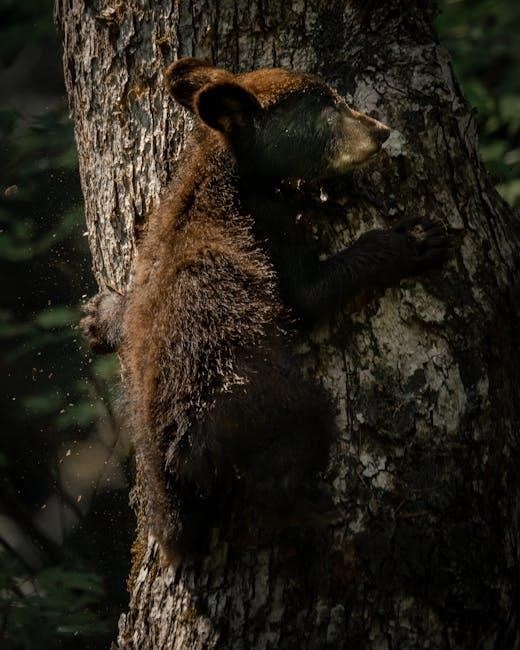
Western North Carolina is a hotspot for black bear hunting due to its vast wilderness and abundant wildlife․ The Great Smoky Mountains National Park and surrounding areas are renowned for their healthy bear populations․ Pisgah National Forest and Nantahala National Forest also offer excellent opportunities‚ with their dense forests and remote terrain․ Additionally‚ the Cherokee National Forest‚ which borders Tennessee‚ is another prime location․ Hunters often target areas near water sources‚ such as rivers and streams‚ as bears frequent these spots․ The region’s varied elevation and vegetation provide ideal habitats for bears‚ making it a top choice for hunters seeking a successful experience in North Carolina․
4․2 Public vs․ Private Lands for Hunting
When it comes to bear hunting in North Carolina‚ understanding the differences between public and private lands is crucial․ Public lands‚ such as national forests and wildlife management areas‚ are accessible to all hunters and offer vast‚ remote territories․ However‚ these areas can become crowded during hunting seasons․ Private lands‚ on the other hand‚ provide exclusivity and often better-managed habitats‚ but access typically requires permission or leasing agreements․ Many hunters prefer private lands for their higher success rates due to controlled hunting pressure and well-maintained food sources․ Public lands‚ like Pisgah and Nantahala National Forests‚ remain popular for their accessibility and abundant bear populations․ Hunters must obtain the necessary permits for both public and private properties to ensure legal and ethical hunting practices․
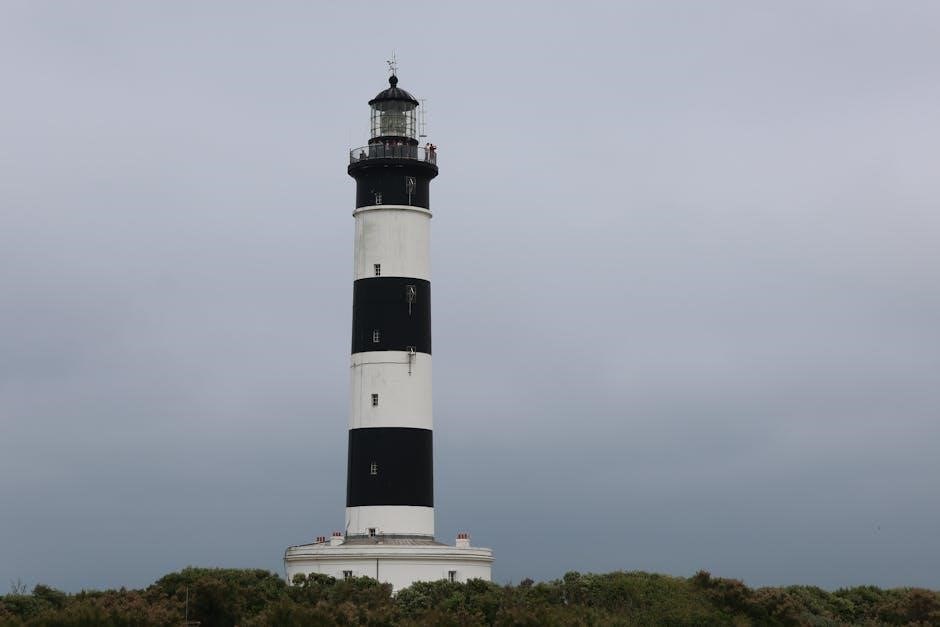
Hunting Methods and Strategies
Bear hunting in North Carolina involves various methods‚ including rifle‚ muzzleloader‚ and bowhunting․ Hunters often use baiting or scenting techniques to attract bears․ Stalking and ambush tactics are also effective strategies․
5․1 Rifle and Muzzleloader Hunting Techniques
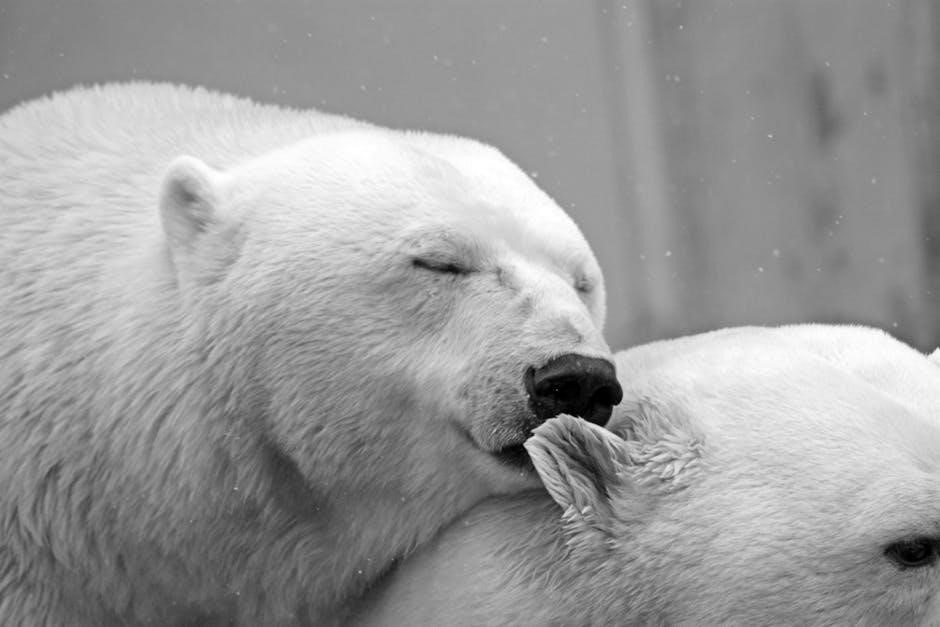
Rifle and muzzleloader hunting are popular methods for bear hunting in North Carolina․ Rifles‚ particularly those chambered in ․30-06 or ․308‚ are favored for their accuracy and stopping power at medium to long ranges․ Muzzleloaders‚ often used during specific seasons‚ require precision and patience‚ as they are typically effective at closer distances․ Hunters often aim for vital areas to ensure ethical and humane kills․ Proper shot placement is critical‚ and scopes or open sights can aid accuracy․ Practicing with these firearms is essential to build proficiency․ Guides emphasize the importance of understanding ballistics and terrain to maximize success․ These techniques are widely used in North Carolina’s diverse habitats‚ making them reliable choices for hunters pursuing black bears․
5․2 Bowhunting Strategies for Black Bears
Bowhunting black bears in North Carolina requires precision and strategy․ Hunters often use tree stands or ground blinds to remain concealed‚ as bears have an excellent sense of smell and hearing․ Camouflage and scent control are critical to avoid detection․ Shot placement is vital‚ with the heart-lung area being the most effective target․ Broadheads designed for large game are recommended․ Bears are most active during early morning and late evening‚ making these prime hunting times․ Hunters should study bear behavior‚ focusing on feeding patterns and trails․ Physical fitness is important‚ as stalking or retrieving game can be challenging․ Guides often emphasize patience and stealth‚ as bears can be unpredictable․ Proper preparation and practice ensure a successful and ethical harvest․
5․3 Baiting and Scenting Methods
Baiting and scenting are effective strategies for attracting black bears in North Carolina․ Hunters often use food-based baits like honey‚ fish‚ or corn to lure bears to specific locations․ Scent attractants‚ such as bear urine or food-based scents‚ are applied to trees or the ground to draw bears closer․ These methods require careful placement and timing to ensure success․ Guides recommend using high-quality baits and scents that mimic natural bear attractants․ Proper bait placement in areas with high bear activity increases the chances of encounters․ However‚ hunters must adhere to local regulations regarding baiting practices․ Combining baiting with scenting creates a powerful draw‚ making it easier to position for a clean shot․ Patience and knowledge of bear behavior are key to maximizing these techniques․
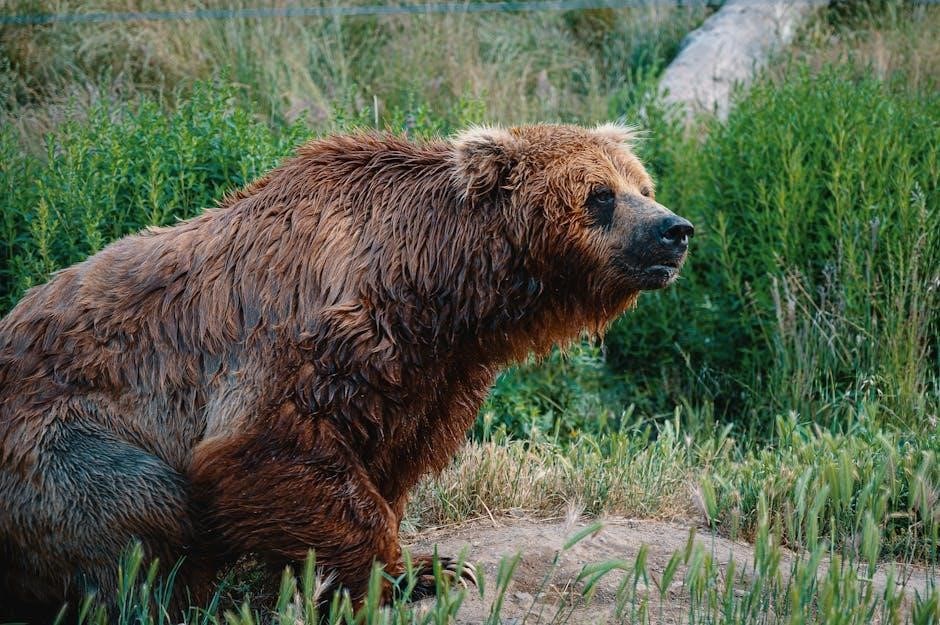
Essential Gear for Bear Hunting
Essential gear for bear hunting in North Carolina includes durable firearms‚ reliable optics‚ sturdy clothing‚ and effective tree stands‚ ensuring a safe and successful hunt․ Guides recommend high-quality equipment tailored to the region’s challenging terrain and conditions․
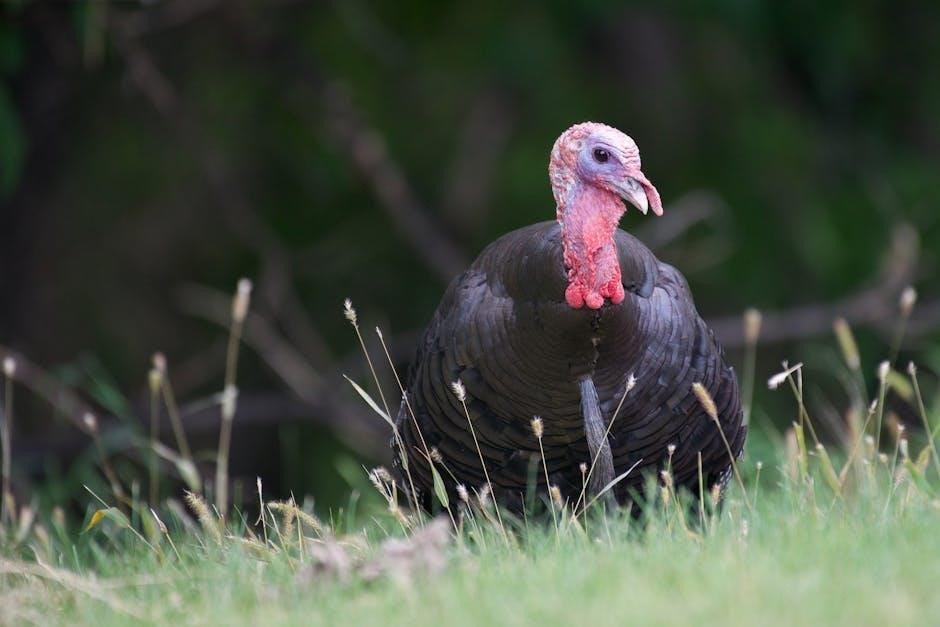
6․1 Firearms and Optics for Bear Hunting
For bear hunting in North Carolina‚ rifles such as ․30-06 Springfield or ․308 Winchester are popular due to their reliability and stopping power․ Scopes with 3-9x magnification are ideal for accuracy at varying distances․ Muzzleloaders are also permitted during specific seasons and offer a traditional hunting experience․ Optics like binoculars (7x or 8x magnification) are essential for spotting and tracking bears in dense terrain․ Red dot sights can enhance close-range accuracy․ Guides recommend sighting in rifles pre-hunt and using durable mounts to withstand rough handling․ Ensuring proper equipment maintenance is crucial for safety and ethical hunting practices․ High-quality optics and firearms are vital for a successful and responsible bear hunting experience in North Carolina’s diverse habitats․
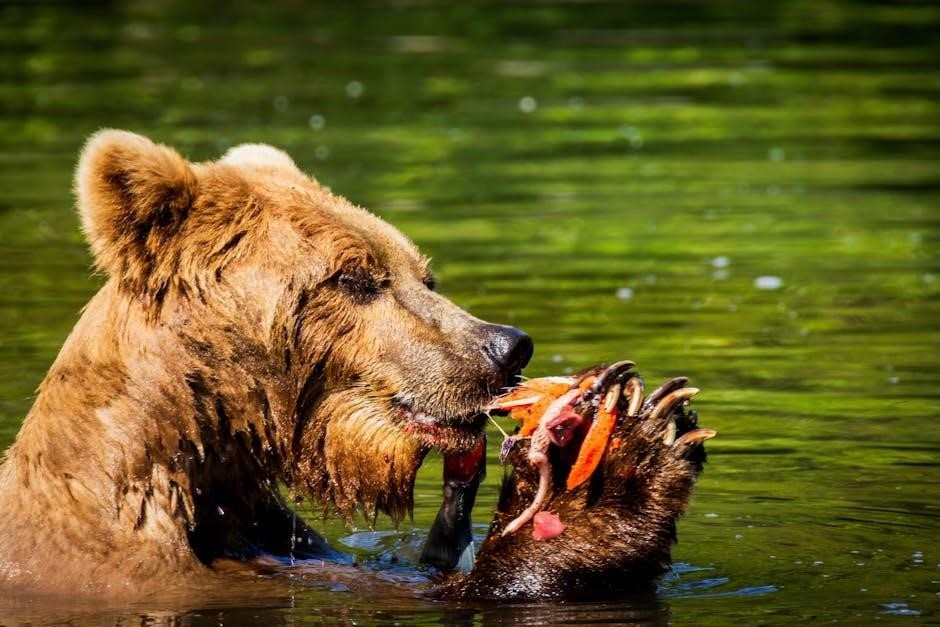
6․2 Clothing and Camouflage for Hunters
Proper clothing and camouflage are essential for successful bear hunting in North Carolina․ Hunters should wear layered‚ breathable clothing to adapt to changing temperatures‚ with moisture-wicking base layers and windproof outerwear․ Earth-toned or camouflage patterns like Realtree or Mossy Oak help hunters blend into the environment․ A good pair of sturdy‚ waterproof boots is crucial for navigating rugged terrain․ Accessories such as hats‚ facemasks‚ and gloves should also match the camouflage theme․ Blaze orange is required during rifle seasons for safety․ Scent-control clothing can reduce the risk of detection by bears․ Investing in high-quality‚ durable gear ensures comfort and effectiveness during long hunting sessions in North Carolina’s varied landscapes․
6․3 Tree Stands and Ground Blinds
Tree stands and ground blinds are critical tools for bear hunters in North Carolina‚ offering concealment and optimal shooting positions․ Tree stands‚ such as ladder stands or hang-on models‚ allow hunters to elevate above the forest floor‚ reducing scent detection and improving visibility․ Ground blinds‚ like pop-up or pit blinds‚ provide cover at eye level‚ blending seamlessly into the surroundings․ Both options should be positioned near game trails‚ bait sites‚ or food sources․ Hunters should set up stands and blinds well in advance to allow bears to acclimate to their presence․ Camouflage and scent control are vital when using these setups․ Proper placement and maintenance can significantly increase the chances of a successful harvest in North Carolina’s diverse bear habitats․
Safety Tips for Bear Hunters
Always carry bear spray‚ make noise while hiking‚ and stay alert․ Keep a clean campsite and store food securely․ Be prepared for emergencies and know bear behavior․
7․1 Preparing for Emergencies in the Field
Always carry a first-aid kit‚ a reliable means of communication‚ and a GPS device․ Know basic first aid for injuries like wounds or broken bones․ Ensure someone knows your hunting plan and expected return time․ Stay with your group and avoid wandering alone in remote areas․ Be aware of weather conditions and terrain hazards․ Carry extra food‚ water‚ and warm clothing in case of unexpected delays․ Familiarize yourself with emergency shelters or landmarks․ Learn how to start a fire and navigate using a compass․ Keep a whistle to signal for help if needed․ Regularly check your gear for functionality and pack essentials like a flashlight and multi-tool․ Stay calm and think clearly in crisis situations․
7․2 Bear Behavior and Encounter Safety
Understanding black bear behavior is crucial for safe hunting․ Most bears avoid humans‚ but they may act defensively if surprised or protecting cubs․ Stay calm during encounters; never run․ Make yourself appear larger by raising arms or opening a jacket․ Avoid direct eye contact‚ as this can provoke aggression․ If a bear approaches‚ speak firmly and slowly back away․ Carry bear spray and know how to use it properly․ Keep firearms accessible but only as a last resort․ Be mindful of baiting areas‚ as they can attract multiple bears․ Hunters should stay alert for signs of bears‚ such as tracks or scat‚ and avoid approaching them․ Maintaining a safe distance and being aware of your surroundings minimizes risks‚ ensuring a safer hunting experience in North Carolina’s wilderness․
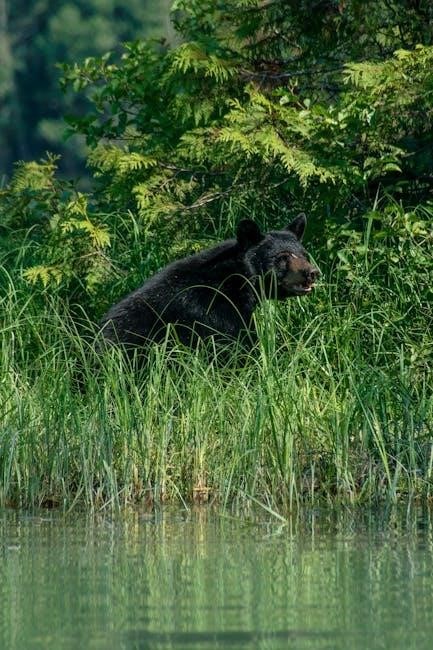
Ethical Hunting Practices
Ethical hunting ensures fair chase‚ minimizing animal stress and ensuring quick‚ humane kills․ Hunters must respect wildlife‚ avoid wasteful practices‚ and support conservation efforts‚ upholding responsible traditions․
8․1 Fair Chase and Responsible Hunting
Fair chase and responsible hunting are cornerstone ethics in bear hunting‚ ensuring animals have a reasonable chance of escape․ Hunters must avoid unethical practices like baiting or excessive use of technology․ Guides in North Carolina emphasize these principles to promote sustainable hunting and respect for wildlife․ Responsible hunting includes adhering to local regulations‚ proper planning‚ and minimizing environmental impact․ Hunters should be prepared‚ knowledgeable about the terrain‚ and committed to ethical practices․ This approach not only preserves the integrity of the hunt but also ensures the long-term health of bear populations and ecosystems․ Ethical hunting fosters a deeper connection with nature and supports conservation efforts for future generations․
8․2 Respect for Wildlife and the Environment
Respecting wildlife and the environment is crucial for sustainable bear hunting in North Carolina․ Guides emphasize minimizing habitat disruption and promoting ethical practices that prioritize animal welfare․ Hunters are encouraged to avoid unnecessary disturbance to the natural surroundings‚ ensuring the ecosystem remains intact․ Proper waste disposal and leaving hunting areas in their original condition are vital․ Adhering to environmental regulations helps preserve biodiversity and maintains the balance of nature․ By fostering a deep appreciation for wildlife‚ hunters contribute to conservation efforts․ Guides play a key role in educating hunters on eco-friendly practices‚ ensuring that the environment is protected for future generations․ This mindset ensures harmonious coexistence between hunting and nature․
Bear hunting in North Carolina offers a unique and rewarding experience‚ blending tradition‚ challenge‚ and connection with nature․ With its well-managed seasons‚ abundant wildlife‚ and expert guides‚ the state provides opportunities for hunters of all skill levels․ From the mountains to the coastal regions‚ diverse landscapes cater to varied hunting preferences․ Ethical practices‚ safety‚ and respect for the environment are cornerstone principles that ensure sustainable hunting for future generations․ Whether you’re a seasoned hunter or a novice‚ North Carolina’s bear hunting guides and resources provide the support needed for a successful and memorable adventure․ This pursuit not only tests skill but also fosters a deeper appreciation for wildlife and the outdoors․